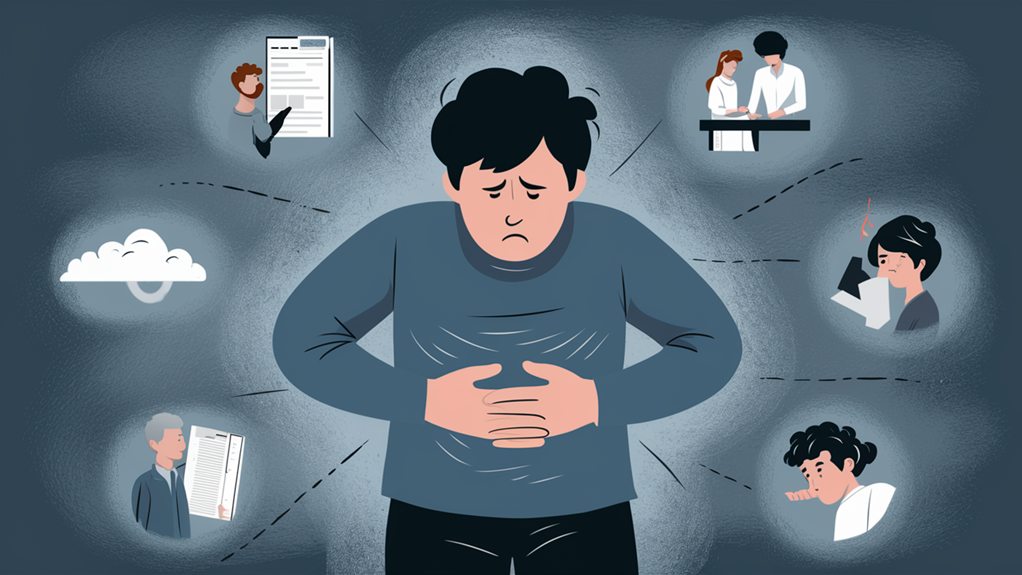Somatic symptom disorders occur when you experience real physical symptoms, like headaches, stomach pain, or fatigue, that stem from psychological factors rather than medical conditions. While your symptoms feel genuinely distressing, they're strongly influenced by emotional stress, anxiety, or other mental health concerns. You'll often notice excessive worry about these physical sensations, which can greatly disrupt your daily activities and relationships. Healthcare providers diagnose these disorders through careful physical examinations, detailed discussions about your symptoms, and various assessment tools. Treatment typically combines cognitive behavioral therapy, medication, and stress management techniques. Understanding the complex connection between your mind and body opens the door to effective management strategies.
Understanding Somatic Symptom Disorders

Physical symptoms can dominate a person's life even when medical tests show no clear physical cause. When you're experiencing genuine physical discomfort, pain, or other symptoms that doctors can't fully explain through testing, you might be dealing with a somatic symptom disorder.
These conditions, also known as psychosomatic disorders, show how deeply your mental health can affect your physical well-being.
You'll notice that somatic symptom disorder symptoms often include real physical sensations, like headaches, stomach pain, or fatigue, which can greatly impact your daily activities.
The physical symptoms of mental health conditions aren't imagined or fake – they're very real to those experiencing them. Your body might be responding to stress, anxiety, or other emotional factors in ways that create genuine physical discomfort.
It's important to understand that these symptoms aren't "all in your head," and you're not making them up. Instead, they represent a complex interaction between your mind and body, where emotional distress manifests as physical symptoms that can be just as challenging as those from any other medical condition.
Common Signs and Symptoms
Recognizing the signs of somatic symptom disorders helps distinguish them from other medical conditions. You'll notice that people with this mental illness experience physical symptoms that cause significant distress and disrupt their daily lives. These symptoms might include pain, fatigue, shortness of breath, or digestive problems that don't have a clear medical explanation.
You'll often see that individuals with somatic symptom disorders focus intensely on their symptoms, spending excessive time and energy worrying about their health. They might frequently check their body for signs of illness, repeatedly seek medical attention, or become extremely anxious about normal bodily sensations.
While their physical symptoms are very real, the level of distress they experience is disproportionate to the actual severity of their condition.
Some common behavioral signs you might notice include avoiding physical activities out of fear, frequently discussing health concerns, and researching symptoms extensively online.
You'll also observe that these individuals may have trouble accepting medical test results that come back normal, leading to requests for additional tests or second opinions.
Causes and Risk Factors

While researchers haven't identified a single definitive cause of somatic symptom disorders, several factors likely contribute to their development. Your genetic makeup, for instance, can make you more susceptible to these conditions, especially if you've got family members who've experienced similar issues.
Additionally, your early life experiences, including trauma or learned behaviors from watching how your family dealt with illness, can greatly shape how you respond to physical sensations.
Your personality traits and how you process emotions can also play an essential role, particularly if you're someone who tends to be more sensitive or anxious about bodily sensations.
Environmental stressors, such as major life changes, relationship problems, or work-related pressures, can trigger or worsen your symptoms.
You're also at higher risk if you've experienced physical or sexual abuse, lived through a serious illness in the past, or struggle with anxiety or depression.
Cultural factors matter too, as different societies have varying ways of expressing and interpreting physical symptoms, which can influence how you experience and communicate your distress.
Diagnosis and Assessment Methods
Medical professionals diagnose somatic symptom disorders through an extensive evaluation process that typically involves multiple steps.
Your doctor will start by performing a thorough physical examination to check for any underlying medical conditions that might explain your symptoms. They'll also review your complete medical history and ask detailed questions about your symptoms, including when they started and how they affect your daily life.
During the assessment, you'll likely need to complete several questionnaires about your symptoms, thoughts, and feelings. Your doctor will look for specific patterns, such as having one or more chronic physical symptoms that cause significant distress and interfere with your everyday activities.
They'll also evaluate how much time and energy you're spending thinking about your symptoms, as this is a key diagnostic factor.
The diagnosis often requires ruling out other medical conditions first, which means you might need various tests or lab work. Your doctor may also use specialized assessment tools, like the Patient Health Questionnaire (PHQ-15) or the Somatic Symptom Severity Scale (SSS-8), to help determine the severity of your condition.
Treatment and Management Strategies

Once a proper diagnosis is established, treatment for somatic symptom disorders typically involves an extensive approach combining several strategies.
You'll likely work with a team of healthcare providers, including your primary care doctor, a psychiatrist, and a therapist, who'll help create a personalized treatment plan.
The most effective treatments often include cognitive behavioral therapy (CBT), where you'll learn to identify and change unhelpful thought patterns and behaviors.
Your doctor might also recommend antidepressants or anti-anxiety medications to help manage your emotional symptoms and reduce stress.
Regular physical activity, stress management techniques, and relaxation exercises, like deep breathing and meditation, can make a big difference in your daily life.
It's important that you maintain regular appointments with your healthcare team and build a strong, trusting relationship with them.
They'll help you develop coping strategies, set realistic goals, and track your progress.
You'll also learn to recognize your triggers and manage your symptoms more effectively.



